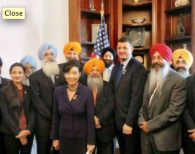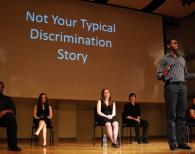Community supports gay politician following assault
CREDIT: Advocate.com
Oklahoma’s first openly gay state politician is receiving vocal support from his community following an assault which he says was motivated by hate. Jim Roth, a Democrat who served on the Oklahoma Cortwas assaulted outside a bar by three men who called him anti-gay slurs during the attack, according to Policymic.
Indiana
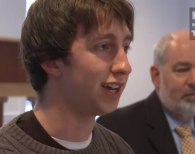
"Part of the motivation of these attacks is to isolate those who they are attacking. To make the victims feel victimized. But thanks to the response of Bloomington United and the community we are made to feel that this is an attack not only on us but the values of the whole community." —Bloomington, Indiana resident
Watch Bloomington United: Ready to Respond to Hate
After Ku Klux Klan flyers blanket an Indiana University campus neighborhood, Rabbi Sue Silberberg leads Bloomington United as they plan a community response.
This is a DVD extra from the PBS program, Not In Our Town: Class Actions. For more information on the film, visit niot.org/ClassActions.
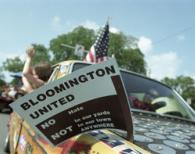
"Bloomington, Indiana: United and Ready to Respond to Hate" is part of the Not In Our Town program, Class Actions, that premieres nationwide on PBS stations in February 2012.
When a string of anti-Semitic acts rocked the college town of Bloomington, Ind. just before Hanukkah in 2010, the town knew how to respond.
Bloomington’s quick and supportive response from the city’s university, police, city, and community leaders comes from experience. The community group Bloomington United was first brought together by the mayor when former Indiana University student and white supremacist Ben Smith started spreading white supremacist and anti-Semitic flyers around town. Several months later, Korean doctoral student Won-Joon Yoon was fatally shot on his way to Bloomington’s Korean Methodist Church, the last killing during Smith’s two-state shooting spree.

Right before the Thanksgiving holiday, we shipped off our next film, Not In Our Town: Class Actions to PBS.
Not in Our Town: Class Actions features three stories of students and their communities standing together to stop hate and bullying. Premieres on PBS stations in 2012.
Fifty years after James Meredith became the first black student at the segregated University of Mississippi, football fans resurface the chant, “The South will rise again.” Student leaders confront the divisive practice, sparking a campus visit from the Ku Klux Klan and a peaceful counter demonstration led by the student organization One Mississippi. Photo Credit: William Bender
The college town of Bloomington, Ind., shocked after a Korean student was murdered by a white supremacist a decade ago, bands together again after anti-Semitic attacks on the eve of Hanukkah. Photo Credit: Bloomington Herald Times
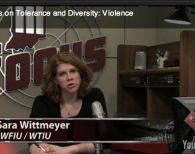
In late November and early December, the city of Bloomington, Ind. stood behind the Jewish community after several acts of anti-Semitic vandalism. Rocks were thrown into the windows of the Chabad and Hillel houses at Indiana University. A glass case listing Jewish Studies faculty was broken. Swastikas were discovered in a student dorm. Then, just days before Hanukkah, Hebrew texts from the university and county libraries were taken to men’s bathrooms and urinated on. Bloomington—a college town—received national attention.
Bloomington’s quick and supportive response from the city’s university, police, city, and community leaders came from experience. Bloomington United, in particular, banded together after the mayor’s office approached local leaders to form a coalition in 1999. At the time, former Indiana University student and white supremacist Ben Smith went on a two-state shooting spree, which included the killing of a Korean graduate student at Indiana University. Read how the community responded to the recent acts.
On Jan. 27, Indiana Public Media's program, InFocus, discussed Diversity and Tolerance. Host Sara Wittmeyer interviewed Not In Our Town Executive Director Jonathan Bernstein on the show.

This Hanukkah, Bloomington, Ind. was blanketed in blue. Indiana University students wore it, community members wore it, and even the city’s cabinet members and clerk’s office staff donned the cool hue on Dec. 6. As Rabbi Sue Silberberg, executive director of the Helene G. Simon Hillel Center, put it succinctly, “Everyone was wearing blue.”
